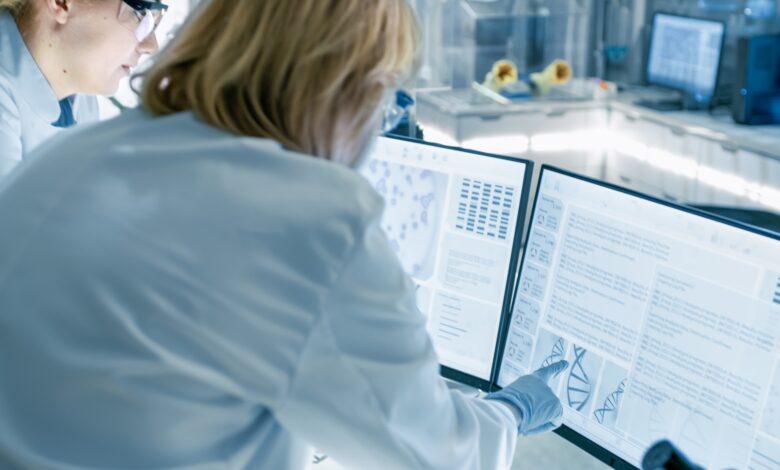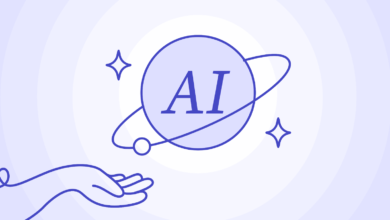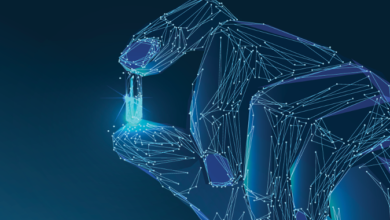
The sequencing and analysis of human DNA have come a long way since the first draft of a human genome as part of the Human Genome Project. As DNA sequencing becomes more affordable every year, the market for genetic testing is growing exponentially – and we need Artificial Intelligence (AI) to keep up. AI has many exciting use cases in this rapidly growing field.
Recent developments in genetic testing
Genetic diseases are caused by mutations or variants in the human genome. Geneticists must locate the causative (or pathogenic) variant to diagnose these conditions. The human genome is composed of around 3 billion base pairs, and the causative variant could be found in any part of it. Sequencing genomes was a costly process in the past: the first draft of a human genome from the Human Genome Project cost $300 million.
In 2006, the cost of sequencing a human genome was estimated at $20-25 million. Thankfully, the cost of genome sequencing has decreased since the $300 million draft of 2003 – with the most recent pricing in 2022 being $200. As a result of this drop in cost, the Next Generation Sequencing (NGS) market has seen rapid growth, with an estimated compound annual growth of over 18% between 2022 and 2030. This has led to genetic testing becoming much more accessible.
Now, the cost of sequencing itself is not the main factor. Analysing data is becoming a bottleneck for labs as the amount of data increases. A long list of variants must be interpreted by a specialist, as many of these variants are either benign or of uncertain significance (a so-called VUS: variant of uncertain significance). Thus, data generation is getting cheaper every year, while the interpretation –finding the pathogenic variant– is still labor- and cost-intensive.
AI developments in genetic testing
One of the applications of AI in genetic testing focuses on exactly this bottleneck, aiding variant scientists in interpreting the data. Here, AI identifies and ranks variants associated with certain diseases and supports variant scientists in their job.
By looking at large datasets of patient data, AI algorithms can identify variants linked to certain diseases. Especially for rare diseases, this can be of great value – as an automated interpretation of variants increases the amount of data you can process. It can also predict pathogenicity of variants of uncertain significance. This can help variant scientists diagnose and treat diseases faster and with higher accuracy.
Another exciting application of AI in genetic testing is its potential to predict how a person may respond to certain treatments. By analysing a person’s genetic data, AI algorithms can identify which treatments may be the most effective for that individual. This could help doctors prescribe the most effective medications for their patients and reduce the risk of adverse side effects. AI can also be used to determine which combination of treatments is most likely to be successful for a particular patient.
In addition to its potential applications in genetic testing, AI technology is also used to develop new disease treatments. AI algorithms can analyse large patient data datasets to identify potential drug targets or treatments that may be effective for a particular condition, and then help create personalised treatments based on an individual’s unique genetic makeup. This could lead to more effective treatments for various diseases and conditions.
Challenges to using AI in genetics
Although the potential of AI in genetic testing is exciting, this doesn’t mean there are no limitations to the technology. As an algorithm is only as good as the data you feed it, we need to look out for bias when using AI in healthcare. After all, the algorithms used are developed by humans with their own biases and perspectives. It is also trained on existing research, which may lead to bias due to, for instance, certain ethnicities being underrepresented.
Additionally, AI tools will only be successful if they are trusted and accepted by the scientific community and society. Finally, AI in healthcare is or will be subject to strict rules and regulations that restrict the use of AI in genetic testing, as well as the use of personal genetic information. While AI has the potential to revolutionise the field of genetic testing, these limitations mean that it must be used with care and caution.
The future of AI in genetic testing is incredibly exciting. AI technology has the potential to revolutionise the way genetic testing is done, leading to more accurate and personalised results. AI algorithms can be used to identify genes associated with certain diseases and traits and to develop new treatments for a wide range of diseases. AI technology will continue to play an important role in the future of genetic testing and will likely continue to transform the way genetic testing is done.




